Abstract
The article deals with digital technologies used at Russian industrial enterprises. The problems, which the enterprises face at introduction of digital technologies, are marked. The risks of digitalization are noted. The relevance of the article is determined by the important influence of digitalization in the development of the world's population of the economy and society as a whole. Modern social development is linked to digital technologies. The importance of digital technologies in modern social and economic conditions is due to the growing attention of company management to the introduction of digital technologies for the future development of enterprises in the market. Therefore, the use of digital technologies not only increases the efficiency of the enterprise, but also enhances the economic position of the country. The digitalization of national productive forces will make it possible to remain competitive in the market. In a post-industrial society. The purpose of the study is to analyze the use of digital technology in industrial enterprises. The objectives of the work include - consideration of enterprises with the use of modern marketing tools; identification of risks and obstacles in the introduction of digital technologies at the enterprise; analysis of the use of digital technology in enterprises. As a result of the research, the digital technologies applied at Russian enterprises were analyzed. The used digital marketing tools are considered, risks and obstacles of use and implementation of digital technologies at enterprises are marked, efficiency of use of digital technologies at modern enterprises is marked.
Keywords: Digital technologiesindustrial enterprisesrobotizationchat - botsoptical recognition
Introduction
The beginning of the XXI century is characterized by a rapid pace of digitalization of industrial sector production. Competitiveness of enterprises, their development in technical and technological terms is determined by the level of information and communication technologies equipment. The establishment of digital technologies can have an impact on the format of product quality, production efficiency, marketing system, and shortening the time to market. The main purpose of digitalization at production is the implementation of integrated information systems capable of to cover all stages of the life cycle of manufactured products. The problem is revealing a large number of complex interconnected production processes (Vizgunov, 2020).
The aim of the study is to analyse the use of digital technology in industrial enterprises. In tasks of work are included - consideration of activity of the enterprises with use of modern marketing tools; revealing of risks and obstacles of introduction of digital technologies at the enterprise; the analysis of use of digital technologies at the enterprises.
Methods
The world is rapidly developing the total digitalization and intellectualization of industry. Russian enterprises are actively introducing digital technologies in management and production. One of the main tasks is the formation of high-tech industry, capable of meeting the requirements of world competitiveness and high labor productivity (Frolova & Naumov, 2019). Enterprises are able to increase their competitiveness in the market by means of active participation in the market. Application of digital technologies in management and production processes of goods and services.
The development of technologies allows enterprises to move to a completely different level of relationships with consumers, the foundation of which is the application of digital marketing. It provides for the transfer of information about a product, service or brand by electronic means, which enable their evaluation in in real time. Such interaction is particularly relevant for small industrial enterprises (Izakova, 2019). It helps to identify the most of the desired product at the moment (Figure
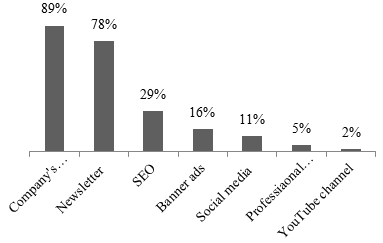
Companies' websites have become the most popular means of informing the organization of their products, major projects, as well as interaction with consumers of products (Belyaeva, 2018). Search support is aimed at optimization and quick search of the company; Email mailing personalizes the offers and allows to establish personal contacts; professional forums give the opportunity to communicate with colleagues, track competitors, learn about promising projects and possible orders, recommend company products, analyze the most common questions, answer them; YouTube channel gives the opportunity to demonstrate the technology and products of the company in action; banner advertising translates the client to the company's website; social media.
Results
Digitalization offers many benefits to improve the competitiveness of enterprises. There is quick access to unlimited information resources, which leads to lower production costs and improved quality of new products, new jobs. The possibility to communicate with suppliers and consumers of services in real time allows to achieve immediate improvement of the offered product, as well as its availability by the consumer in any part of the world (Dorodnykh, 2017).
Digital technologies have a positive impact on the quality of a product or service, which contributes (Digital technologies in Russian companies… 2019; Frolova & Naumov, 2019):
- maximum satisfaction of customer needs;
- shorter development, manufacturing and delivery times to the end consumer;
- reduction of enterprise costs due to process automation;
- increase of safety at work;
- development of new forms of cooperation with organizations and consumers using digital technologies.
The largest Russian companies have already embarked on the path of digital changes in production. Among the companies which already use digital technologies about 50% carry out robotization of processes on technology RPA, use 4 and more robots on manufacture, introduce chat-bots which are most often used for service of clients (Digital technologies in Russian companies…, 2019).
What do companies expect from introduction of digital technologies? Let us define a hypothesis:
Does the management of companies that already use digital technologies in production consider their expectations justified?
To begin with, we should consider what major obstacles Russian companies face on the way to digitalization (Figure
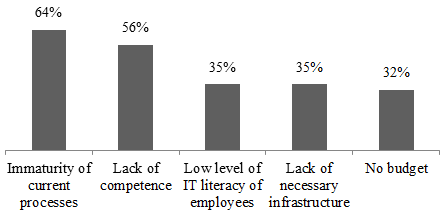
Many respondents pointed to several reasons that hinder the implementation of digitalization in production. The most frequently mentioned barriers to digitalization are "immaturity of current processes" and "lack of competence". Undoubtedly, the reasons that hinder the digitalization are related to the need for transformation of production processes at the enterprise, unpreparedness of employees for changes in production, unwillingness to obtain new knowledge (Korovin, 2019).
Besides, with introduction of digitalization there are certain threats. First, it is connected with a role of "live work" on manufacture and revision of requirements to workers. Job automation is capable of leaving millions of people out of work. At the same time, the need for specialists in digitalization will increase. The researches of The Boston Consulting Group indicate the lack of 10 million specialists in analytical work for effective data processing and information management by 2025 (Yakovlev, 2018).
Clarify the threats associated with the introduction and use of digital technologies (Yakovlev, 2018).
- Cybercrime is the main risk of introducing digital technologies, associated with the possible destruction of the information structure, data theft and fraud;
- mass unemployment - the robotization of a large number of jobs leads to the disappearance of a number of professions, especially low and medium skill levels. Unemployment is on the rise;
- Lagging the education system behind the transformation of the labour market - the education system has not been able to adapt to the changes resulting from digitalization;
- digital inequality of citizens is a result of age, gender and educational background;
- Legal and regulatory framework lagging behind technological development - crimes committed using information and communication networks have discrepancies with the legal interpretation of regulations.
Therefore, the introduction and use of digital technologies in industrial enterprises is impossible without certain risks. It is possible to minimize such risks during their qualitative study and analysis (Eskindarov et al., 2019).
In order to implement a digitalization program at industrial enterprises, it is also necessary to have a competent policy of managers. They should clearly define what kind of digital strategy the organization will have, promoting integration of personnel, processes and technologies (Digital technologies in Russian companies. Research results. KPMG, 2019).
In the course of the research, the most popular digital technologies used at Russian enterprises were identified (Figure
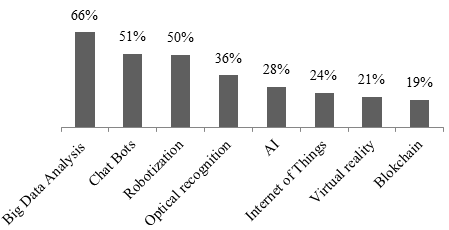
Respondents were more likely to indicate multiple answer choices, indicating a desire for more digital innovation in production. Thus, according to the survey, Russian enterprises most often use big data analysis, chat-bots and robots in the production process. Let us characterize popular digital technologies among Russian companies.
Large data analysis and predictive analytics. High-quality and mobile processing of large volumes of data can improve the efficiency of productivity at the enterprise. Predictive analytics is used to analyze large volumes of data and make forecasts. Most often used in analytics, customer service, sales and marketing. Predictive analytics is used by IT companies, telecom, metallurgical enterprises (figure
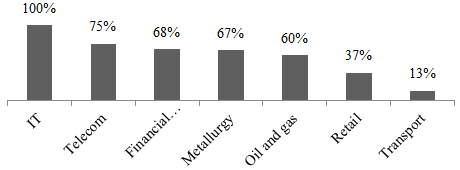
Robotization (RPA). Robotization of manual routine operations takes place, thus increasing operational efficiency by reducing payroll and human factor risks.
According to the research, among the enterprises under consideration 5% answered that robots are not capable of replacing employees at the enterprise (enterprises of metallurgy), 32% believe that one robot is capable of replacing up to 3 employees on average (enterprises of oil and gas), also 32% believe that robots will replace 4-10 employees (banks and financial institutions), 21% spoke out about releasing more than 10 employees (heads of telecom companies), 10% refrained from answering.
Most often robots are introduced in such subdivisions as finance and accounting, operational unit, HR department, and customer service.
Chat bots. Programs that simulate human speech and text, perform functions of interaction with queries and quick search for information. According to the research, companies prefer to develop chat bots on their own platform. Chat bots are most often used in customer service, operating unit, document management with suppliers, the least frequently used to perform procurement.
Optical recognition is a technology of recognition of signs. This technology is most often used by financial institutions, metallurgical enterprises, retail (figure

Implementation of this technology in production can reduce the amount of time spent on document processing, improve the quality of data entry by minimizing errors, reduce material costs of document processing, increase the speed and quality of customer service (Mikhailov et al., 2019).
According to the research, out of the listed technologies already used at the enterprises the greatest economic effect was brought by the figure
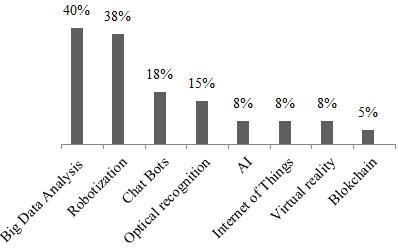
Therefore, the greatest economic effect among respondents was brought by the robotization of business processes, predictive analytics and analysis of large data. Research has shown that introduction and use of digital technologies at the enterprises allows to raise quality of made production, efficiency of manufacture, satisfaction of client requirements, to reduce terms of manufacturing and delivery of production, to lower expenses, to increase safety on manufacture and to expand forms of cooperation with suppliers and consumers (Lukina & Makarov, 2017).
By results of research of hundred the largest companies, about 77% count on reduction of expenses and productivity increase at the expense of introduction of digital technologies. Robotization of business processes releases the personnel from routine operations. Decisions on the basis of the big data give the chance to raise productivity at the expense of improvement of quality of decisions made by the employee (Digital technologies in Russian companies. Research results. KPMG, 2019).
According to a survey of 88% of CEOs of large companies believe that digitalization brings more opportunities than threats.
Returning to our hypothesis "Does management of companies that already use digital technologies in production consider their expectations justified," we must agree that the use of digital technologies in production, you can get an increase in productivity, quality of goods and services created at lower costs.
Conclusion
One of the urgent tasks of our country's economic development is its digitalization. The Russian economy is not yet receptive to the introduction of digital technologies. In the course of the research it has been established that enterprises strive to improve their competitiveness in the market by actively applying digital technologies in the processes of management and production of goods and services. The level of interaction with consumers using digital marketing is being improved. This leads to the transfer of information about a product, service or brand by means of electronic means, which enable their evaluation in real time.
The main obstacles on the way to digitalization of Russian companies have been identified - immaturity of current processes, low level of automation, low level of knowledge in the field of information technologies of employees, painful replacement of established production business processes at the enterprise, lack of unified standards of product quality, lack of normative support, growth of requirements to the personnel, as well as risks associated with the introduction of digital technologies - cybercrime, mass unemployment, lagging behind the transformation of the educational system. The necessary condition for the effective implementation of digital technologies at the enterprise is the competent policy of managers, the desire and readiness of employees for the process of digitalization.
Among the most popular technologies of implementation at the enterprise are analysis of big data and predictive analytics, robotization, chat bots, optical recognition, artificial intelligence. According to the research, the introduction and use of digital technologies at the enterprises gives the opportunity to improve the quality of products, production efficiency, customer satisfaction, reduce the time of production and delivery, reduce costs, increase safety in production and expand forms of cooperation with suppliers and consumers.
References
- Belyaeva, M. V. (2018). Classification of modern digital technologies used in management system of industrial enterprises. Journal of Scientific Notes of Russian Academy of Entrepreneurship, 21-29.
- Digital technologies in Russian companies, Research results. KPMG. (2019, January). https://assets.kpmg/content/dam/kpmg/ru/pdf/2019/01/ru-ru-digital-technologies-in-russian-companies.pdf
- Dorodnykh, E. E. (2017). Analysis of implementation of digital production at the industrial enterprises (in Russian). Proc. of scientific-practical conference with international participation, 380-394.
- Eskindarov, M., Maslennikov, V., & Maslennikov, O. V. (2019). Risks and Chances of Digital Economy in Russia. Finance: Theory and Practice, 23(5).
- Frolova, E. A., & Naumov, A. F. (2019). Practice of implementation of digital technologies at the Russian industrial enterprises (in Russian). Materials of the VI International Scientific and Practical Conference, 198-143.
- Izakova, N. B. (2019). Opportunities of digital marketing technologies for small industrial enterprises of Ural macro-region. Materials of the I Ural Economic Forum, 73-78.
- Korovin, G. B. (2019). Social and economic aspects of digitalization in Russia (in Russian). Journal of Economic Theory, 16(1), 1-11.
- Lukina, S. V., & Makarov, V. M. (2017). Technique of estimation of efficiency of industrial enterprise production activity from use of digital technologies and manufactures (in Russian). Materials of the All-Russia scientific-practical conference, 15-17.
- Mikhailov, V. V., Babkin, A. V., & Goroshko, V. V. (2019). Digital technologies in economy and industry (in Russian). Proceedings of the national scientific-practical conference with international participation. Peter the Great University.
- Vizgunov, A. N. (2020). Global problems of the national economy modernization (in Russian). Proc. of IX International scientific-practical conference. National Research University Higher School of Economics, 279-288.
- Yakovlev, G. I. (2018). Development of enterprises competitiveness on the basis of the digital technologies. Synergy, 3. https://cyberleninka.ru/article/n/razvitie-konkurentosposobnosti-predpriyatiy-na-osnove-tsifrovyh-tehnologiy (accessed: 07.06.2020).
Copyright information

This work is licensed under a Creative Commons Attribution-NonCommercial-NoDerivatives 4.0 International License.
About this article
Publication Date
08 March 2021
Article Doi
eBook ISBN
978-1-80296-102-7
Publisher
European Publisher
Volume
103
Print ISBN (optional)
-
Edition Number
1st Edition
Pages
1-644
Subjects
Digital economy, cybersecurity, entrepreneurship, business models, organizational behavior, entrepreneurial behavior, behavioral finance, personnel competencies
Cite this article as:
Kipervar, L. A., Kipervar, E. A., & Mamay, E. V. (2021). Digital Technology In Industrial Enterprises. In N. Lomakin (Ed.), Finance, Entrepreneurship and Technologies in Digital Economy, vol 103. European Proceedings of Social and Behavioural Sciences (pp. 178-185). European Publisher. https://doi.org/10.15405/epsbs.2021.03.23

